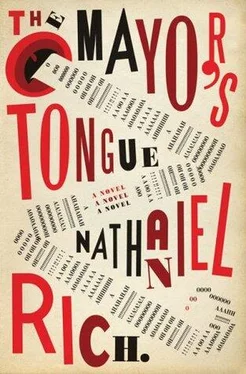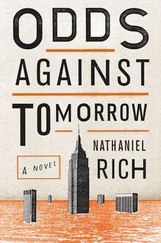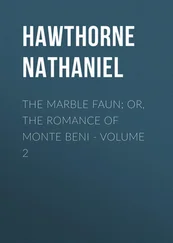Mr. Schmitz drives up the Carso's dirt access road with a gym bag on his lap. The bag contains a laptop computer, an electroencephalogram control module with an LED screen, a receiver box, a plastic baggie stuffed with tangled electrode wires, a battery pack, a four-ounce tube of Lectron conductivity gel, a twenty-milliliter syringe, and a fourteen-gauge needle, all bought from a disgruntled nurse at the hospital for the equivalent, in lire, of $400, thanks to the strength of the American dollar. For an extra $400, she took a cigarette break while Mr. Schmitz rolled Rutherford out in a wheelchair through the back door. Using Rutherford's passport and Italian driver's license, he rented a car — a supermini turquoise Fiat Punto. Mr. Schmitz clutches the gym bag to his chest in the tightest and most gentle embrace he can manage while guiding the steering wheel with his other hand, but the mountain road doesn't make it easy for him. The car halts and jitters, and the gym bag hits so violently against Mr. Schmitz's chest that he wonders whether the subsequent rattling noises, indicative of severe dislodgment and fracture, are emanating from the medical equipment or from his rib cage. Rutherford's face falls flush against the window, then against his friend's shoulder — in a misplaced pose of affection — and finally it is sent nodding forward and back, giving him the aspect of a man who is completely satisfied with the course his life is taking.
Several hours into the ascent, all the hubcaps are gone. The Punto coughs warnings of irreparable engine damage, to add to its other injuries: scratched roof (courtesy of a low-hanging pine branch), a smashed headlight (from an errant tree stump that encroached on the edge of the road), a cracked, bloodstained windshield (crashed into by an idiot sparrow, fatally surprised by the hard reflective surface), and a deflating tire that makes the chassis tilt toward the cliff side of the road, which would afford Rutherford, were he sensate, a breathtaking view of the steep valley directly below them.
With one final lurch, the Punto arrives on a level roadway, and the brick houses of Ternova appear alongside it. To Mr. Schmitz, it's like seeing a childhood friend for the first time as an adult: slightly corrupted, wizened, but recognizable at last. The town— if such an honorific can be applied to it — is six dilapidated brick cottages, each two stories high, standing side-by-side along the road skirting the cliff 's edge. The cottages are just as Mr. Schmitz remembers them, only their walls are darker and pockmarked, and their roofs' terra-cotta shingles have blanched in the sun. Two newer buildings have been adjoined, their slate-gray walls and flat roofs representative of a particular architectural vogue popular in Italy during the 1970s; but the arrangement of cottages, and the stone paths leading between them, up into the hills, are just as Mr. Schmitz recalls. What he remembers most vividly lies beyond the last of these buildings, at the end of the town, where the street rises on a slight incline to its highest point: the piazza. It is paved in red-and-yellow checkerboard squares, and at its crest there stands a small monastery. More than fifty years earlier, Mr. Schmitz and Rutherford held dances there, entertaining the daughters of the local farmers. Roused by the twinkle of the church organ playing a profane tune, the girls would sneak out in the middle of the night and head to the monastery, giddy at their own audacity. There they danced with the American soldiers, cheek to cheek, lit by the yellow glow of a hundred candles.
Mr. Schmitz recalls how the local farmers and winemakers would convene after dinner each night for involved debates in the piazza; how a group of women would cluck their tongues and promenade arm-in-arm down the stone paths, calling up to other women, who leaned out of second-story windows, their arms crossed and perched on the sills. There was so much commotion that they could pretend not to notice the regiment of American soldiers bivouacked in the town, crowding the local tavern. But this late summer afternoon, the town is silent. The grocery is closed, even though it is midweek; so is the old tavern. There is no one in the street. There aren't even any parked cars.
"Do you remember all this?" asks Mr. Schmitz. "Rutherford?" Rutherford's eyes are open, staring upward.
"To our left the old taverna," continues Mr. Schmitz. "To our right the red-and-yellow marble piazza. It's still shiny and smooth, just as it was. And the monastery — our private dance hall!"
At the foot of the piazza, Mr. Schmitz opens the trunk of the Punto and pulls out a collapsed wheelchair. He painstakingly reassembles it, forcing the metal joints into place, smoothing the blue canvas seat, and clucking to himself with satisfaction when it all clicks together. Under great physical strain, he drags Rutherford's heavy body into the chair, the patient's floppy limbs thwacking Mr. Schmitz across the mouth and chest. Mr. Schmitz wheels Rutherford through the piazza so that he can face the view.
"Ternova," he says into Rutherford's ear." We're back, old boy."
Mr. Schmitz hustles to retrieve the gym bag from the car. He sets it on the marble tiles and pulls down on the zipper, his mouth screwed up and spittled with concentration. Out of the bag spill shattered electrodes, loose screws, and torn tubing. A round plastic widget springs up at Mr. Schmitz, leaps over his shoulder, and rolls down the remaining length of the piazza, where it slides under the barricade and over the cliff. Mr. Schmitz looks at Rutherford and, for the first time all day, begins to think about where they are, and how far away that is.
Constance Eakins spoke, and his voice was legend. "Speak," he said in a gentle tone, though it seemed as loud as the shout of a hundred hale men." Don't come any closer. Stand there — if you're a man — and SPEAK to the Mayor."
Eugene couldn't say a thing. He couldn't even walk — the man's voice had stopped him so abruptly that the soles of his sneakers made a squeaking noise against the floor. He had to remind himself to inhale. As he did, he noticed that a vast pile of plates, bowls, glasses, and cutlery was amassed before him, bearing a quantity of food and drink fit for a full banquet. Except for one plate, on which there lay a black revolver.
"The whores at the Trieste naval base," said the voice, "call me 'Constant' Eakins. But you can call me Connie." In addition to its sheer volume, the man's voice was distinguished by a patrician inflection, a modulation that resembled a British accent — though Eugene could detect in his powerful baritone, especially at the end of sentences, a Southern lilt.
"Is it really you?"
"Are you a man?" The giant chortled. It occurred to Eugene that this person, whoever he was, was drunk.
"Mr. Eakins," he began, "my name is Eugene. I work as an assistant for Abe Chisholm. I'm also good friends with his daughter, Sonia."
"Isn't she a beautiful child?" said Eakins, sighing.
"Yes. I'm also a great admirer of your work. Dolman Hardy is my favorite novel, and the essay 'Why Men Live' was really important to me too."
Eakins did not reply at first, but Eugene could hear him breathing through his mouth — a reverberant, quavering huff. An arm like an elephant's trunk, reticulated by blue, ropelike veins, emerged from the gloom in a pardoning gesture.
"It is always gratifying to learn that one's vision has been greeted by a glimmer of recognition in the mind of a reader," said Eakins, yawning ferociously as he did so. Then his voice deepened. "It's almost as sweet," he continued, "as the sight of one's private phantoms writhing and clawing into existence, becoming real. Walking straight out of your brain and onto the earth.
Читать дальше












